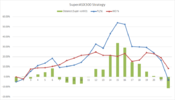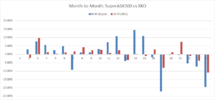- Joined
- 2 August 2016
- Posts
- 897
- Reactions
- 1,492
Interestingly enough, I also think trading a system with only 4 open positions at any one time reduces my chances of getting into a company that is exposed to sovereign risk, as opposed to spreading your portfolio over a larger number of stocks like 10 to 20. The trade off here is obviously volatility, which I don’t see as risk, so, I’m happy to weather it.@peter2 always glad when you chime in. ?
Let me address some of the commentary above and explain why I do things the way I am doing them.
One of the reasons I stuck with the ASX100 was liquidity. Even though I only have a relatively small SMSF balance at the moment, I wanted a stock selection universe that my fund could grow into, if you will. I didn’t want to have to worry about larger bid ask spreads on days when I needed to buy or sell. Additionally, as my fund grows I will be allocating funds to other asset classes so the SMSF getting too large for the system and chosen universe is basically impossible. Plus, I will build in that diversification.
Other things like my backtest results showed much larger maxDD’s using this system on a broader universe such as the ASX300. Easily in the realm of -60%+ maxDD’s. More than I was willing to tolerate.
One thing I personally do when I am entering and exiting positions is that I never leave the orders pending. I log on at lunch time usually when I’m at work and I execute my orders instantly. For example, I log in to my broker, look at how many shares I need to sell for a particular stock, then I check the bid depth and let’s say I want to sell 1000 shares and the bid depth is 1500 shares at $2.45, then I immediately place my limit order to sell 1000 shares with a limit of $2.45 and I am instantly filled and I don’t have to worry about getting slipped. Obviously it’s the reverse for buys.
As for the Sovereign Risk factor, yes I am aware of it and it is very hard to manage but I believe trading a narrower, larger cap, liquid universe should eliminate some, but never all of this risk. Again, back to my many reasons for staying with the ASX100.


